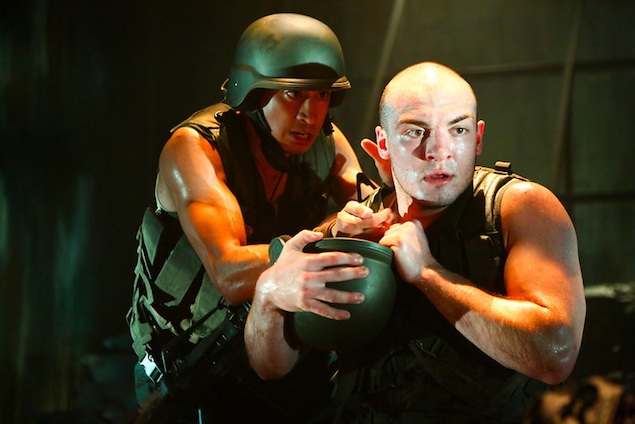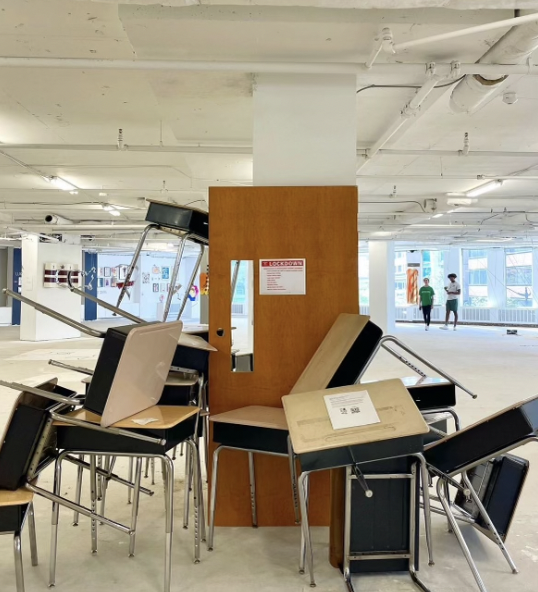
Cinematic images perpetually tug at the creative heart of Synetic Theater’s
Paata Tsikurishvili. Audiences may see his now-iconic blend of acting, dance, and athletics as a uniquely theatrical hybrid, but the influence
of cinema has always been there, flickering and flashing through everything he ever conjures.
In the company’s narratively flawed but visually stunning original piece,
Home of the Soldier, Synetic’s artistic director has a
particularly galvanizing canvas on which to splash his multimedia
vision. When sights
and sounds—as opposed to dialogue and plot—fill the stage, the
show is riveting. It’s in the second half that this tale of
an American soldier deployed abroad founders on an overextended
plot and clichés.
Synetic company member and resident fight choreographer
Ben Cunis wrote the script, using interviews
with military people as background research. Some of the
soldier-to-soldier dialogue has
a distinct ring of authenticity, but as the show veers toward
its implausibly coincidental climax, Cunis and director Tsikurishvili
felt compelled to throw in practically every issue one hears
about today relating to the military—post-traumatic stress disorder,
roadside bombs, questions pertaining to torture, relations
between men and women in the military, Skyping with the folks back
home. It’s too much for one play.
But those glitches aren’t made manifest until long after an audience has been gobsmacked by the first half of the play, which
is strong enough to hold their attention even after things falter. A young American soldier (Vato Tsikurishvili) begins basic training.
Joseph Carlson, utterly convincing as the drill sergeant, puts the young recruit and his cohorts through their paces, barking them through
a macho-balletic sequence (choreographed by
Irina Tsikurishvili and Cunis) that is visually and verbally mesmerizing, set to an explosive electronic score by Synetic’s resident composer,
Konstantine Lortkipanidze. This is the kind of thrilling stagecraft that earns Synetic its stripes.
Played with a muscular, sullen single-mindedness by
the 21-year-old offspring of Paata and Irina Tsikurishvili, the young
soldier, actually dubbed “Son” in the playbill, rarely speaks—a
quirk of Cunis’s script—but he has a secret that radically
shifts the direction of the second half of the story and also,
unfortunately, challenges the credibility of the work. But
before all that, when the show’s visual and dramatic
ingredients are still firing on all cylinders, the Son is deployed to
an unnamed, violence-riven country not unlike Afghanistan.
Situations test his moral mettle—the first time he kills someone,
the sight of a fellow soldier about to torture or rape a female
prisoner.
The ghostly male and female insurgents in this scary land are clad by costume designer
Laree Lentz in surprisingly stylish garb more
reminiscent of a modern-dance troupe—black sleeveless vests for the men
(the better to
show off those trademark Synetic muscles) and long,
head-covering shawls and skirts for the women, all overlaid with leafy
scraps of fabric as a kind of camouflage.
The Son acquires information from an insurgent that
pulls his entire squad into a risky mission. As it becomes more and more
contrived, the story stumbles to its end, yet it still manages
to be quite moving. This is due in no small part to the exciting
multimedia elements in the production. Whenever the soldiers
are attacked, or encounter a roadside bomb, some of those sandbags
piled at the back of
Daniel Pinha’s desolate, scaffold-ringed set fall down. As they do, the back wall is revealed, and the spectacular multimedia designs
of
Riki K. projected onto it turn the production
into something that rises above its uneven script. A collage of video on
multiple screens
shows “location” footage of soldiers on patrol, catching a
sniper, or searching for someone as the soldiers onstage move in
tandem or counterpoint to it. In one poignant scene, we see the
“live” soldiers talking to their families at home via Skype,
and their families are projected on the video wall and heard in
the audio track, in a kind of loving babble. It is very, very
affecting. Throughout the show, Riki K.’s designs bring an epic
quality to a script that doesn’t quite match it.
This is a show that Synetic should continue to revise and rework, because they’re onto something major. It’s just unfinished.
Home of the Soldier
is at Synetic Theater through July 1. Running time 90 minutes, no intermission. Tickets ($45 to $55) are available through
Synetic’s website.

















